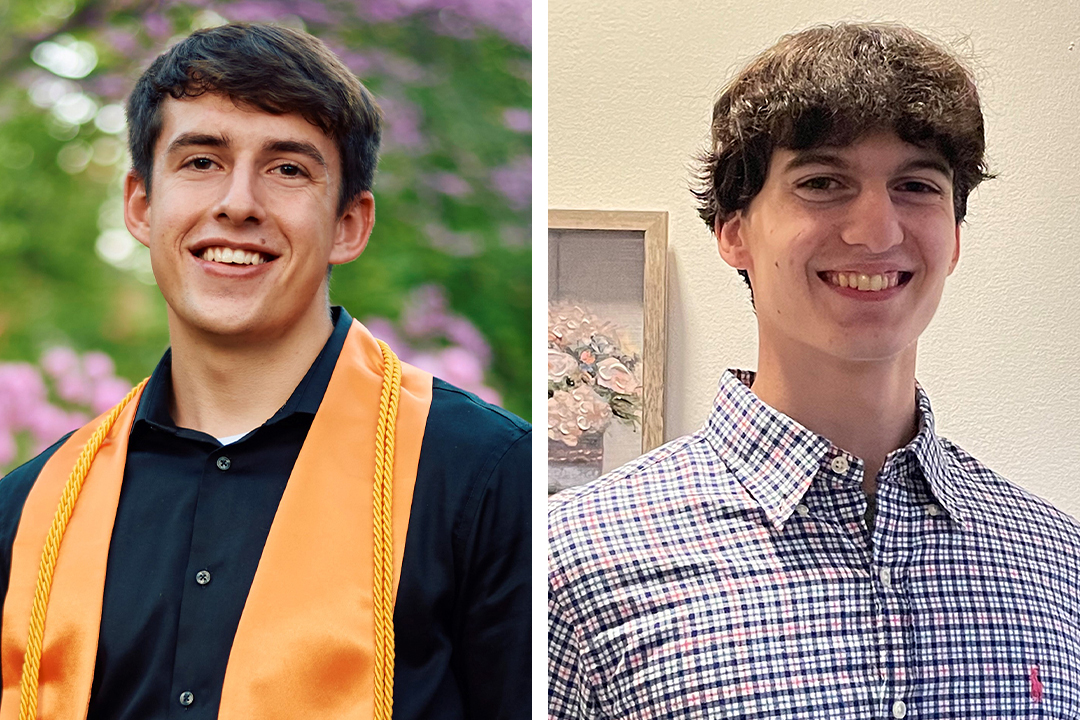First RIT cohort in BS/MD program begins first year at SUNY Upstate Medical University
Provided
RIT 2022 alumni Cameron Shuman and Zach Williams started medical school this year through an accelerated BS/MS program with SUNY Upstate Medical University.
Rochester Institute of Technology graduates Cameron Shuman and Zach Williams followed a different route to medical school than many of their peers, bypassing the medical school entrance exam and the competitive application process, to take their seats at State University of New York Upstate Medical University.
Williams and Shuman, 2022 graduates from the biomedical sciences program, represent the first cohort of BS/MD students from the RIT and SUNY Upstate Medical Accelerated Scholars Program. The university-wide program is open to all RIT colleges and majors. It guarantees qualified RIT graduates admission to Upstate Medical’s traditional Allopathic Medicine program and waives the Medical College Admission Test (MCAT) requirement for admission.
Without the Accelerated Scholars Program, Williams and Shuman would have been among more than 62,000 applicants competing for 23,000 seats—an increase of more than 17.8 percent from 2020—according to data from the Association of American Medical Colleges.
When the articulation agreement with Upstate Medical was signed in 2019, Douglas Merrill, the then-director of Pre-Medical and Pre-Health Professional Advising, encouraged Shuman and Williams to apply. The biomedical sciences students had just completed their first year at RIT, and they were quickly accepted into the BS/MD program.
“It took a massive weight off my shoulders,” said Shuman. “If you’re not in the accelerated program, you have to worry about taking months to study for the MCAT and making yourself the most competitive applicant you can. But when you already have a seat, you are able to spend more time on research and your classes.”
Shuman focused on research in biomedical sciences professor Robert Osgood’s lab, exploring the conditions that lead to inner ear infections, and his work as a medical scribe and medical assistant at a local podiatry clinic. Childhood surgeries had introduced Shuman at a young age to medical professionals and to a memorable anesthesiologist who put him at ease before a surgery. These formative experiences shaped Shuman’s aspirations for medical school.
While at RIT, both Shuman and Williams were active in the Health and Technology Student Association. Williams’ involvement led to leadership positions as president and vice president of the club during his third and fourth years, respectively. He also took on leadership roles in the biochemistry lab run by his mentor, associate professor Lea Michel, in the College of Science. As an undergraduate researcher working in Michel’s lab, Williams studied proteins in the lens of the eye that could be linked to congenital cataracts.
Both Shuman and Williams are thankful for the opportunity the BS/MD program gave them and remain cognizant of the privilege. “It allowed me a little more time and a lot more confidence to step up and to be more of a leader in the RIT community and in the RIT premedical community, and to help others who might be seeking some of the same goals reach them,” Williams stated.
Williams likes working with his hands and wants to become a surgeon. “To see the tangible effects of the care that I provide to my patients is something I have always been interested in.”
The selection process for the Accelerated Scholars Program changed after the second cohort formed. Nikhila Rao, Nilesh Rao, and Swathi Jacob, all biomedical science students who graduated early this spring, will attend Upstate Medical in fall 2023. Now, a small committee “sorts through more than 1,000 applications” from high school students seeking to enroll in the BS/MD program, said Elizabeth Perry, director of Pre-Medical and Pre-Health Professional Advising, which is housed in the College of Health Sciences and Technology and serves all RIT students. “We put forward a diverse list of 20 finalists for five seats in medical school.”
Shuman and Williams know how valuable each seat is to students aspiring to medical careers.
“Medicine has everything I want,” Shuman said. “It will allow me to do the things I want to do to help people and the community. “It’s also a challenge: ‘Can you get through medical school? Can you get through residency? And can you actually become a practicing physician?’”
For his part, Williams takes the long game. “I just want to be some sort of small change for someone, and some driving force to make my patients’ lives even just a little better.”









